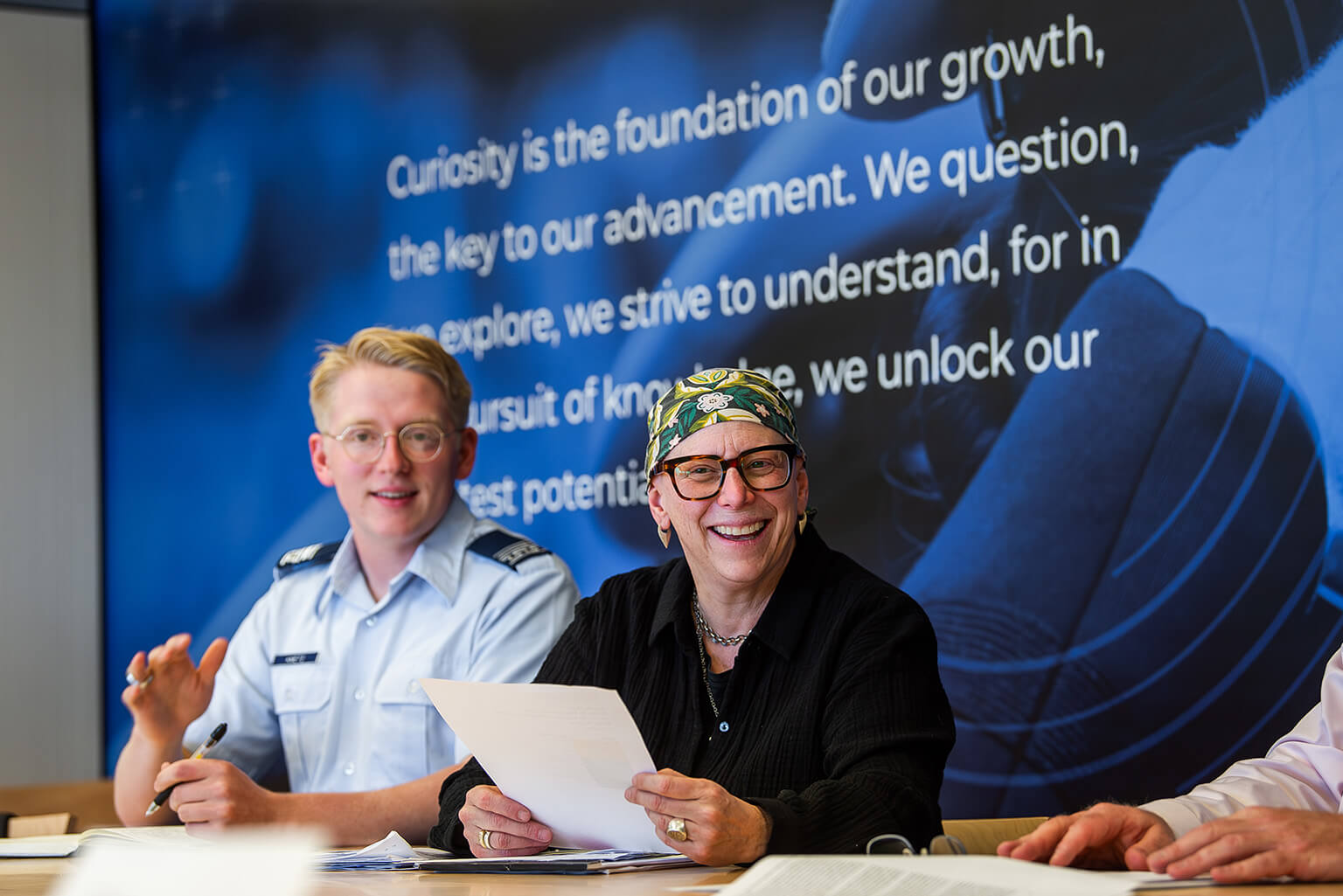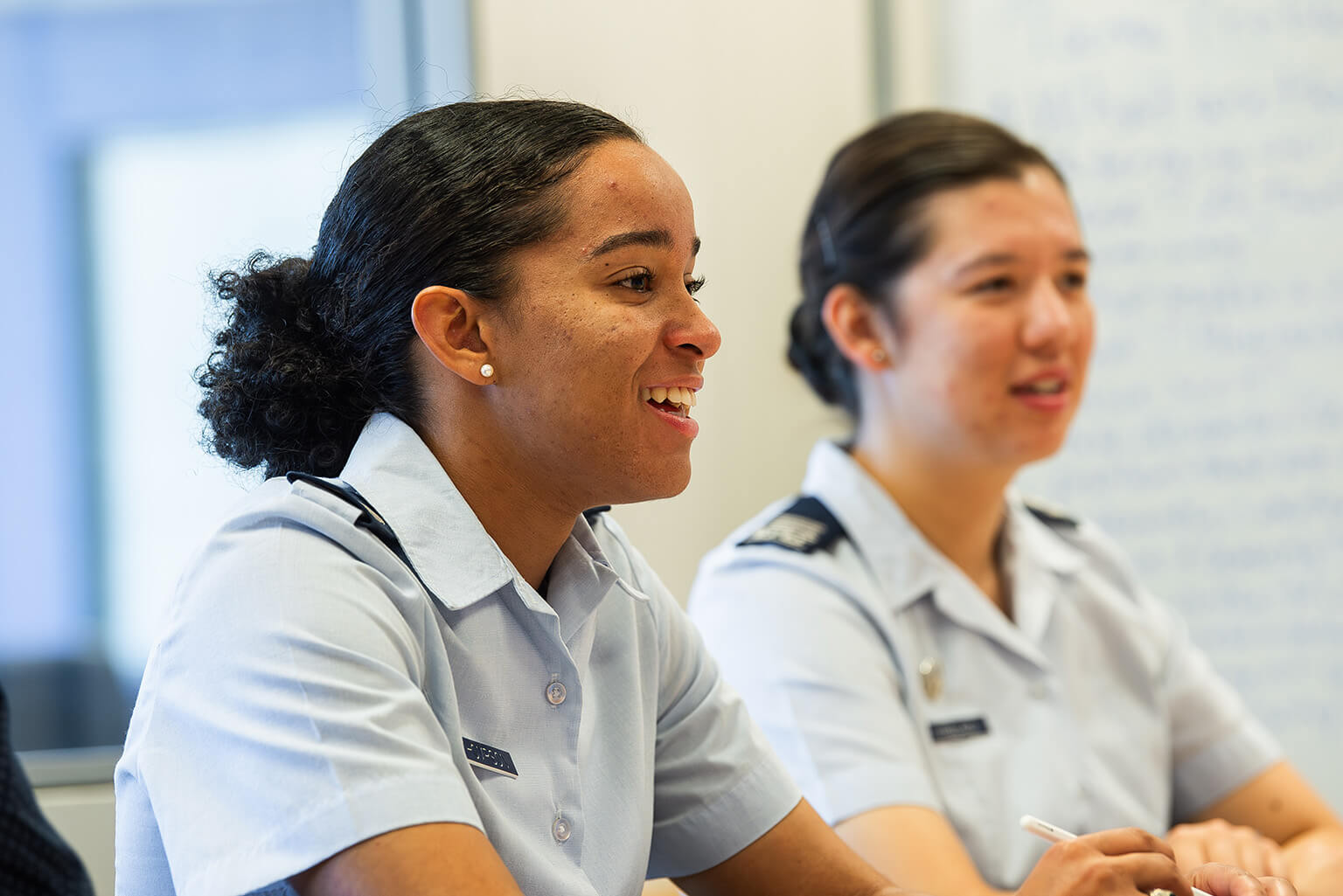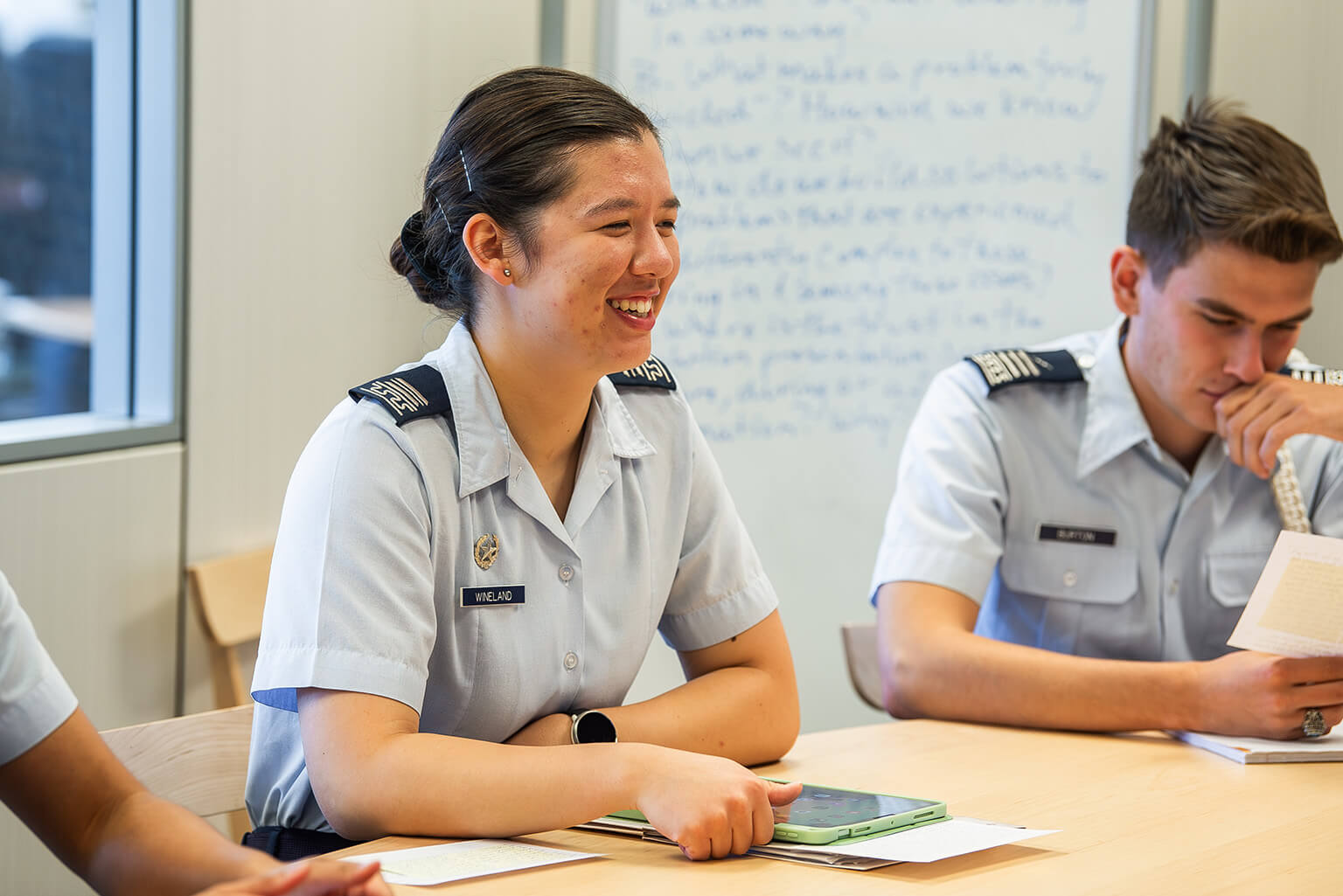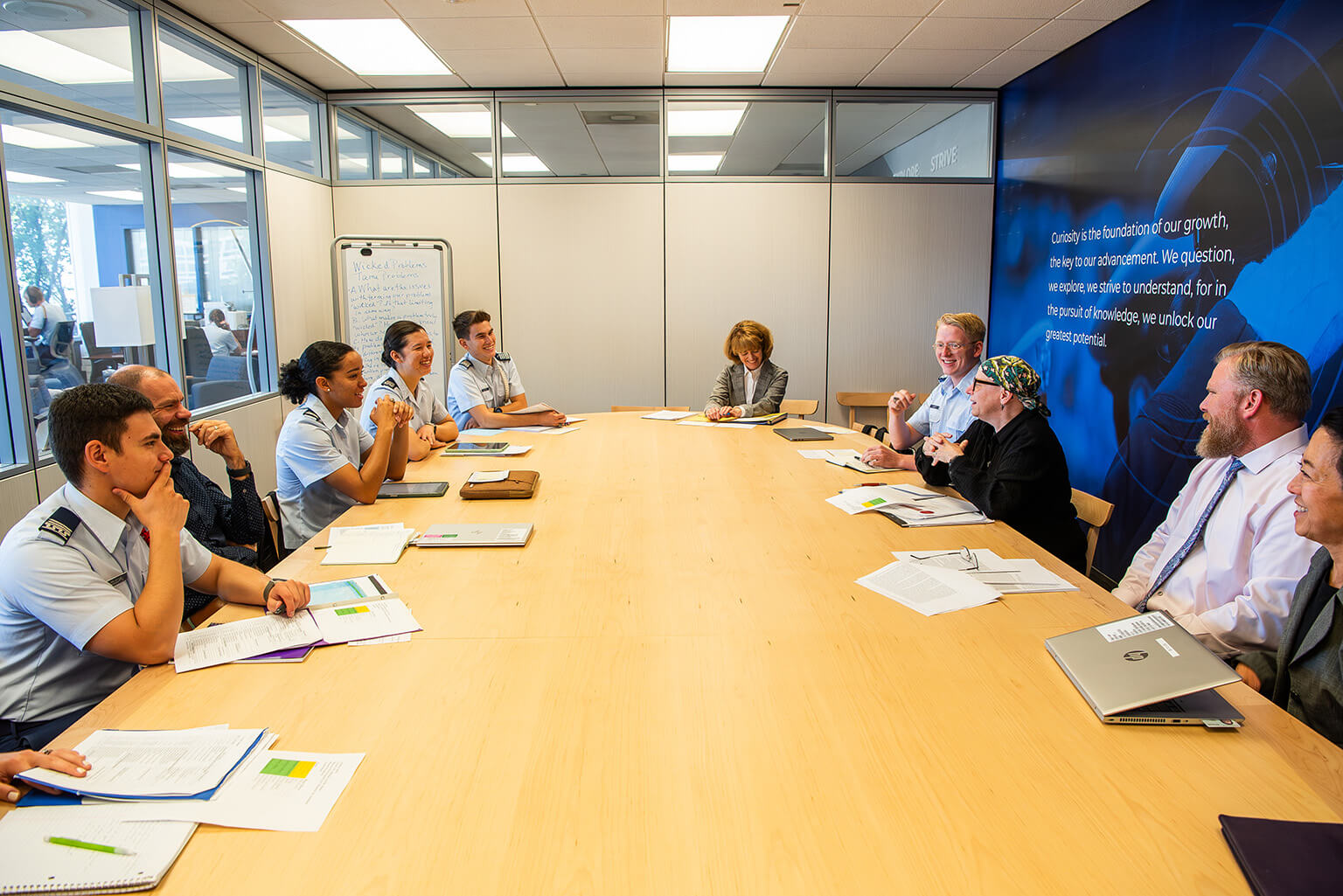Critical thinking laboratory

Martinson Honors Program Director Dr. Diana Polley and Cadet 1st Class Elliott Kmetz listen to scholar conversation in the Reflecting on Wicked Problems capstone course Aug. 27, 2024. All scholar-cadets must take the course during their final year at the U.S. Air Force Academy. (U.S. Air Force photo by Trevor Cokley)
By Randy Roughton
U.S. Air Force Academy Strategic Communications
U.S. AIR FORCE ACADEMY, Colo. – Martinson Honors Program cadets seek answers to difficult problems through reasoning, reflection, research, engaged communication and problem-solving. Director Dr. Diana Polley calls it a warrior-scholar’s critical thinking laboratory.
“In terms of critical thinking, we give our scholars as much freedom as possible to allow for innovation in the classroom,” Polley said. “Our classes are first and foremost cadet-centered. We flip the script on the ‘sage on the stage’ paradigm. In our classrooms, our cadets drive the discussion.”
Martinson Honors Program faculty accomplish this in many ways. Class sizes are small, ranging between 12-15 cadets. Instruction is centered on discussion rather than lectures. Additionally, professors develop and hone innovative instructional practices.
“I try not to show our scholars the answer or even suggest that there is necessarily a right answer,” Polley said. “We emphasize that when they stop asking questions, they aren’t thinking critically. I want them to feel comfortable knowing they may never find the ‘right’ answer and that uncertainty is a fundamental part of critical thinking.”

Cadet 1st Class Melina Thompson smiles during discussion in the Reflecting on Wicked Problems capstone course Aug. 27, 2024. All cadets in the Martinson Honors Program must take the course during their final year at the U.S. Air Force Academy. (U.S. Air Force photo by Trevor Cokley)
What is the Martinson Honors Program?
About 350 cadets are in the Martinson Honors Program. Cadets with a 3.5 GPA or higher are admitted by an invitation and application. Less than 10% of the Cadet Wing are accepted. It replaced the former Academy Scholars Program after a $10 million donation by philanthropist John Martinson, Class of 1970, in 2022. The curriculum supports academic excellence by emphasizing the importance of intelligent curiosity, cognitive engagement across disciplines, applied learning and strong verbal and written abilities.
It is a holistic program that integrates an innovative and interdisciplinary curriculum with unique co-curricular enrichment experiences. Through the program, warrior scholars annually develop original perspectives on the history of ideas and develop creative problem-solving approaches.
Program graduates leave the Academy better prepared to accept challenging 21st-century command positions and with a commitment to lifelong learning to foster their growth as U.S. Air Force and U.S. Space Force officers, she said.

Cadet 1st Class Samantha Wineland laughs during discussion in the Reflecting on Wicked Problems capstone course Aug. 27, 2024. All cadets in the Martinson Honors Program must take the course during their final year at the U.S. Air Force Academy. (U.S. Air Force photo by Trevor Cokley)
Cadet success measured by more than grades
While exceptional grade point averages are a factor for acceptance into the scholar program, applicants are equally evaluated by other criteria, Polley said. One metric is a passion for learning and educational experiences. The ideal scholar has a genuine desire to learn, ask questions and develop a deeper understanding of the why.
Cadet 2nd Class John Trace Ruleman, a Foreign Area Studies with a focus on Political Science and a Japanese minor, achieved a 4.0 GPA in high school and came to the Academy looking for an academic challenge. He always grasped concepts in class easily, but he has learned from fellow cadets and MHP faculty how to get beyond what he calls “surface-level” learning.
“Engaging in a seminar-style learning environment makes me grasp information far more easily because it’s coming from my classmates instead of a Powerpoint or a lecture,” he said. “Jotting down notes from a whiteboard doesn’t take much brainpower or critical thinking, but making an impactful contribution to an academic session with your peers certainly does.”
After graduation, Ruleman plans to attend graduate school, and his goal is to become a foreign area officer. The skills he learns in MHP classroom discussions will serve him well on his diplomatic journey, Ruleman said.
“These skills will vastly assist me in my career,” Ruleman said. “What is diplomacy but the exchange of ideas through the lens of statecraft? Even beyond my goal of becoming a diplomat, critical thinking and communication skills are the ultimate tools of an officer. The elite, Socratic learning style the MHP provides is invaluable for providing cadets for this kind of an environment.”
A metacognitive approach to education
The MHP vision of critical thinking involves a metacognitive approach to education, Polley said. This approach includes cadet curricular and extracurricular activities to achieve learning and program outcomes.
“I stress the holistic nature of the program, specifically in our scholar courses, enrichment experiences on and off campus, community and cohort engagement and cultural opportunities,” Polley said. “We ask our scholars to think critically about their own thinking.”

Martinson Honors Program scholars discuss how to tackle difficult issues in the Reflecting on Wicked Problems capstone course Aug. 27, 2024. All cadets in the Martinson Honors Program must take the course during their final year at the U.S. Air Force Academy. (U.S. Air Force photo by Trevor Cokley)
Ruleman says that since joining the MHP, he has been exposed to many new perspectives and deeper thinking.
“These new perspectives made me bolder with my thinking,” Ruleman said. “I think outside the box more, look at problems from multiple angles and understand others’ arguments to a much greater degree. Engaging with so many bright minds has expanded my thinking and enabled me to find solutions more quickly.”